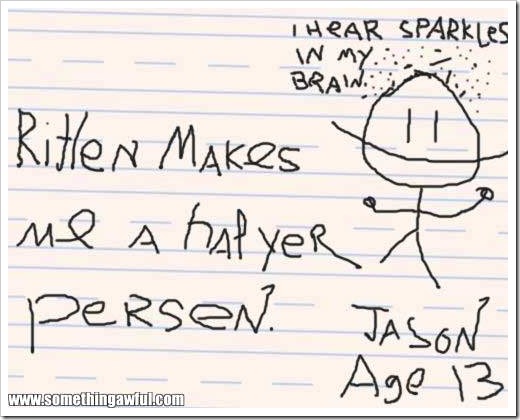
Matt was a troublemaker. He disturbed the class, made lots of noises and fought with the other kids in class. It was unbearable. His teacher tried different methods to stop this behavior, but nothing helped, so he invited Matt’s presents for a talk.
Matt’s parents came to see the teacher and he told them about his failed attempts to calm him down and keep the order in class.
“I’ve tried everything I could and exhausted my options”, said the teacher and asked Matt’s parents about his behavior at home.
Matt’s dad said, “We’ve tried everything ourselves. We punish him, we bribe him, but nothing helps”.
“Have you tried diagnosing him?” asked the teacher.
“I don’t believe in diagnosing. It won’t help. It’s not practical,” said Matt’s mom.
“Well, how about giving him Ritalin?” suggested the teacher, “It will calm him down”.
“Where do we get Ritalin?” Matt’s dad asked.
“Oh, don’t worry, I’ll arrange this for you. Matt will take one tablet every day before he comes to school and everything will be OK”, said the teacher.
“Well, that won’t work”, said Matt’s mom, “Our mornings are very hectic. My husband leaves home early and I rush the kids to school. Who’s going to make sure he takes his tablet?”
“OK, then I can help you with this”, said the teacher, “I will give him the tablet myself when he gets to school”.
“No way!” said Matt’s dad, “I don’t want all the other kids to see him taking Ritalin. Having a bad reputation can be worse than causing trouble. I don’t want my child to suffer from a bad reputation”.
The teacher thought about it and said, “I have an Idea. Every day during the first break, I will ask him to go to the staff room and make me a cup of coffee. I will leave his Ritalin in my pigeonhole, he will take one tablet and no one will know about it”.
The parents were hesitant a bit, but decided to give it a go.
The plan was brilliant. The teacher left the Ritalin in his pigeonhole in the staff room, explained to Matt what to do and every day during the first break, he asked Matt to go to the staff room and make him a cup of coffee. Matt brought the coffee and everything went smoothly. The environment in class calmed right down. Matt was relaxed, he was no longer nervous, did not get involved in any fights or cause any trouble to his teachers.

“How’s school, Matty?”
“Excellent!” said Matt.
“Is the teacher happy with your behavior?” she asked.
“Oh, yes. Everything’s great now. Everyone in the class is happy,” said Matt.
“Wow”, said Matt’s mom, “How come everything got so much better in such a short time?”
“Oh, it’s very simple”, Matt explained, “Every day, my teacher tells me to get him a cup of coffee. I go to the staff room, make him some coffee, take a tablet from his pigeonhole and put in his coffee. He drinks it and everyone in class is much more relaxed!”
If you are reading this and saying, “Ha, ha, it worked on the teacher”, that was no my point. I believe it would have worked even if Matt had thrown the Ritalin into the rubbish bin every day.
You see, perception is a powerful thing. What we believe to be true is sometimes stronger than what happens to us in real life. If we interpret a child’s behavior as “troublemaking”, we will see troublemaking in every move he or she makes. This is why medical researchers always consider the “placebo effect” to find out if the person reacts to the medication or the thought of being medicated.
When diagnosing kids with learning difficulties, the real problem is often “teaching difficulties”. Diagnosing ADD, ADHD, ODD can be a result of “teaching and/or parenting difficulties”. We try some strategies and say we have done everything we could.
But we have not!
I had inspiring Special Education teachers that gave me the best belief every teacher and parent needs.
If you have tried some things and the child is still struggling, it only means you have not found a solution … yet!
How to work with troublemakers

Instead of searching for labels or using a magic pill, search for a solution. Here are some things to keep you focused and to keep you going.
- Try every approach for at least 3 weeks. It takes 21 days to make a habit and preferably 21 days in a row.
- If something has worked for someone else and not for you, be happy! You are closer to the solution, because now you know something you did not know before trying it. You know what does not work.
- Be open minded about potential solutions. If you do not understand something, that does not mean it is out of the question. I was very skeptical about finding a solution for my kids’ dairy allergy when I went to see a kinesiologist. I still do not understand how he did it. One visit and $75 later (mostly paid by my health insurance) our life was changed forever.
- Be creative! If you have tried conventional ways and they have not seemed to work, try something different.
- Consider the placebo effect. Give your kids Vitamin C in a special container without a label and tell them it is a magic pill and that every child who takes it feels relaxed, calm and able to manage difficulties better within 3 weeks. Tell the teachers to assess the child’s behavior during those three weeks. From my experience, the teacher will tell you the child is much calmer. If you want to boost your credibility with your child and with the teacher, tell them an expert has given you this special prescription, along with a story about how expensive the tablets are, how many kids use them and what wonderful results they all get.
If you think you have tried everything, think again. This is an overused phrase and it is never ever true.
If all else fails, before you lose hope, take some Ritalin yourself.
Happy times,
Ronit











